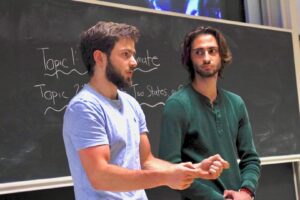Every November, I urge my undergraduate students to vote. For many of them, this election will be their first. I remind them of the urgency of voting — how the simple act of voting gives voice to their needs, their desires, and the hopes of people like them. I share the pride they feel when they cast their first ballots.
When people first vote as adolescents and young adults, they tend to be lifelong voters. For children of immigrants, they may be the first in their family to vote.
We must also assess whether and how we support civic education in our schools, especially high school.
Social studies is less frequently tested than math, science, or reading. However, that does not make it any less important. A strong democracy requires an educated citizenry, and we rely on schools to provide that education; whether we support public education will determine the fate of our democracy.
In fact, high schools can have a transformative role in improving both registration rates and actual voting. Not only are educated people more likely to vote, research suggests that high school social studies courses promote voting among children of immigrants.
Unfortunately voter turnout is low, with only 53.6 percent of registered voters in 2012 actually voting. Naturalized citizens and U.S.-born children of immigrants vote in even lower numbers, with Hispanics less likely to vote than blacks or whites.
At the same time, demographics are changing. The Census Bureau predicts minorities will become the majority by 2044. Children of color already account for the majority of new births, and nationally, 20 percent of school-age children have one or more foreign-born parents.
In Texas, it’s 25 percent. Preserving a strong democracy in Texas, as well as the nation, requires that we ensure the civic education of today’s youths.
That’s why social studies courses are so important, especially for children of immigrants. Parental education predicts whether a young adult will register to vote and vote. However, among children of foreign-born parents, parental education demonstrates no such relationship.
Rather, for these young adults, high school social studies course taking is of the utmost importance. A strong democracy requires an educated populace invested in its own governance.
In a recent study we conducted, we asked a number of early-adult children of immigrants about their high school social studies experiences. Many identified teachers as their civic role models. They recalled teachers who inspired them to become involved, take on leadership in their communities, vote, and make their voices heard. The teachers held high civic expectations, but these youths did not know how their teachers voted, which shows that the teachers didn’t sway our youths to their political leanings.
In an era when educational accountability is based on outcomes, too often social studies falls to the wayside. In response, too many schools focus on math and reading above all else, reducing the time spent teaching social studies and science in the elementary grades.
This is especially true in schools that serve primarily students of color and children of immigrants. Now, more than ever it is critical to support our public schools and the civic education they provide.
Given the lower rates of social studies course taking among adolescent children of immigrants, a significant loss of civic potential in the coming decades is a real possibility if we don’t take action now. Voting is key to preserving a solid democracy. We must make sure all students receive the tools necessary to understand their responsibility and make the dream come true.
Rebecca Callahan is an associate professor of curriculum and instruction in the College of Education at The University of Texas at Austin. She recently co-authored the book, “Coming of Political Age: American Schools and the Civic Development of Immigrant Youth.
A version of this op-ed appeared in the Houston Chronicle, Waco Tribune Herald, McAllen Monitor and the Austin American Statesman.
To view more op-eds from Texas Perspectives, click here.
Like us on Facebook.




